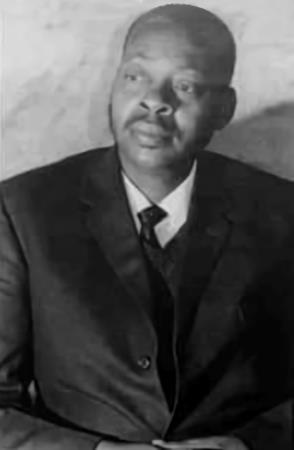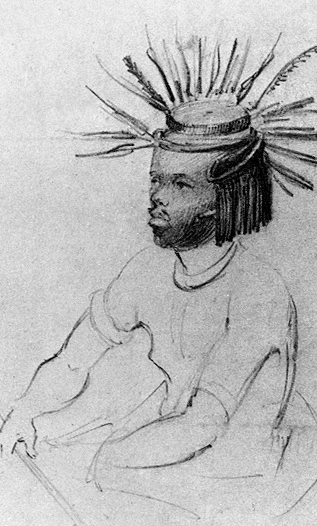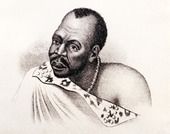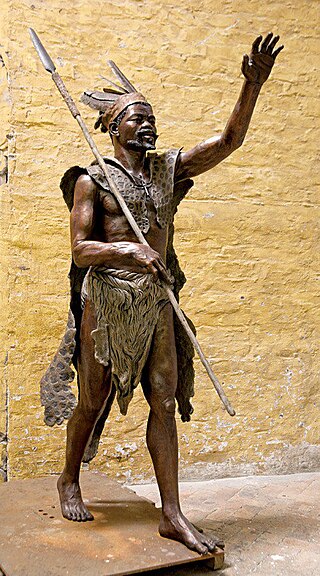Related Research Articles

Cyprian Bhekuzulu Nyangayezizwe kaSolomon was the king of the Zulu nation from 1948 until his death at Nongoma in 1968. He succeeded his father, king Solomon kaDinuzulu, after a lengthy succession dispute which was only resolved in 1944. His uncle, Arthur Mshiyeni kaDinuzulu, functioned as regent during the succession dispute and Cyprian's minority.

The Thembu are Xhosa people who were living in the Thembu Kingdom.

The Mpondo People or simply Ama-Mpondo, is one of the kingdoms in what is now the Eastern Cape. Having been established way back in 1226. The Ama-Mpondo Nation were first ruled by its founder who was King Mpondo kaNjanya who lived around and later the 'Ama-Nyawuza'clan, by nationality referred to themselves as 'Ama-Mpondo'. They are related to other Aba-Mbo kingdoms and chiefdoms in South Africa.

Hintsa ka Khawuta, also known as Great or King Hintsa, was the king of the Xhosa Kingdom, founded by his great ancestor, King Tshawe. He ruled from 1820 until his death in 1835. The Xhosa Kingdom, at its peak, during his reign stretched from Mbhashe River, south of Mthatha to the Gamtoos River, in the Southern Cape.
King Xolilizwe KaZwelidumile was the King of the Xhosa people from 10 April 1965 to 31 December 2005. King Xolilizwe was an active member of the National House of Traditional Leaders of South Africa. He was the oldest son of King Bungeni Zwelidumile Sigcawu.

Pondoland or Mpondoland, is a natural region on the South African shores of the Indian Ocean. It is located in the coastal belt of the Eastern Cape province. Its territory is the former Mpondo Kingdom of the Mpondo people.

The Bhaca people or amaBhaca are an eMbo ethnic group in South Africa.

Faku Ka-Ngqungqushe, son of King Ngqungqushe kaNyawuza was the last ruling monarch of the United AmaMpondo Kingdom in Southern Africa from 1818-1867. During his reign, King Faku consolidated and unified several groups and expanded the territory he had inherited from his father. In 1844, he forged an alliance with the Cape Colony and encouraged British colonization of Natal, thus ensuring his own kingdom would have boundaries that were defined according to Western standards at the time. The kingdom was eventually annexed by the British Empire, became part of the Cape Colony and is today a section of the Eastern Cape province of South Africa.
The Rharhabe House is the second senior house of the Xhosa Kingdom. Its royal palace is in the former Ciskei and its counterpart in the former Transkei is the Gcaleka, which is the great house of Phalo.
King (iKumkani) Maxhob'ayakhawuleza Sandile was the son of the late King Mxolisi Sandile "Aa! Bazindlovu", who was the son of King Archie Velile Sandile, and Queen Nolizwe, the daughter of Western Mpondoland King Victor Poto Ndamase "Aa! Bhekuzulu", and sister to both King Tutor Vulindlela Ndamase "Aa! Nyangelizwe" and the wife of Chief Thandathu Jongilizwe Mabandla of the AmaBhele aseTyhume royal clan. He was the 9th descendant of King Phalo, the Son of King Tshiwo.

The Gcaleka House is the Great house of the Xhosa Kingdom in what is now the Eastern Cape. Its royal palace is in the former Transkei and its counterpart in the former Ciskei is the Rharhabe, which is the right hand house of Phalo.

Port St. Johns Municipality is a local municipality within the OR Tambo District Municipality, in the Eastern Cape province of South Africa.
King Madzikane was the founder and a King of the amaBhaca Nation.

Matiwane ka Masumpa, son of Masumpa, was the king of an independent Nguni-speaking nation, the amaNgwane, a people named after Matiwane's ancestor Ngwane ka Kgwadi. The amaNgwane lived at the headwaters of the White Umfolozi, in what is now Vryheid in northern KwaZulu-Natal. The cunning of Matiwane would keep the amaNgwane one step ahead of the ravages of the rising Zulu kingdom, but their actions also set the Mfecane in motion. After his nation was ousted from their homeland by Zwide with Shaka, Matiwane and his armies clashed with neighboring nations as he attempted to nourish his people. Eventually he fled South into lands occupied by abaThembu, amaMpondo and the neighboring Xhosa nations, which ultimately teamed up with the British and got his nation dismantled and scattered as smaller splinters at the Battle of Mbholompo in what is today Mthatha in the Eastern Cape. In his exodus from Mthatha, Matiwane and the biggest of the amaNgwane splinters was sheltered by baSotho but eventually had to return to his country, Ntenjwa, which he had settled briefly upon fleeing from his old country on uMfolozi omhlophe. Being back at Ntenjwa put a very much weakened amaNgwane and the king, Matiwane, within easy reach of the Zulu nation he had fled from. Matiwane had to then go make peace with the Zulu king, now Dingane, successor to Shaka. This despotic ruler put Matiwane to death shortly after Matiwane sought peace with the amaZulu.
The Imidushane clan was founded by one of the greatest Xhosa warriors Prince Mdushane who was the eldest son of Prince Ndlambe, the son of King Rharhabe.

According to their own tradition, the Bomvana originate from the AmaNgwane, a people from KwaZulu-Natal. The AmaBomvana are descended from Nomafu, the first of the AmaNgwana tribe and from Bomvu, who gave rise to the AmaBomvu tribe. Bomvu's Great Son, Nyonemnyam, carried on the Bomvu dynasty. His son Njilo is the progenitor of the AmaBomvana. The AmaBomvana people left Natal in 1650 to settle in Pondoland after a dispute over cattle. After the death of Njilo’s wife, their grandson Dibandlela refused to send, in accordance with custom, the isizi cattle to his grandfather. This led to an open dispute. Dibandlela fled with his supporters and their cattle to settle in Pondoland

The Mpondomise people, also called Ama-Mpondomise, are a Xhosa-speaking people. Their traditional homeland has been in the contemporary era Eastern Cape province of South Africa, during apartheid they were located both in the Ciskei and Transkei region. Like other separate Xhosa-speaking kingdoms such as Aba-Thembu and Ama-Mpondo, they speak Xhosa and are at times considered as part of the Xhosa people.
Queen Mamani kaPhahlo was a queen of the AmaMpondomise Kingdom from 1732, following after her father, King Phahlo. She is also known as Queen Mbingwa. As the eldest among three daughters of the Great Wife of King Phahlo, she successfully challenged her half-brothers from the smaller houses for the throne upon the death of her father. She married Princess Ntsibatha, a Mpondo princess, she died in May 1758 without any heirs to the throne. She was succeeded by one of her brothers, King Sonthlo, who she installed in her position despite challenges from Within the royal family members at that time
References
- ↑ Stapleton, Timothy (2001). Faku: Rulership and Colonialism in the AmaMpondo Kingdom (c. 1780-1867). Waterloo, Ontario: Wilfrid Laurier Univ. Press. pp. 11, 12, 13, 14. ISBN 9780889203457.
- ↑ Kropf, Albert. Das Volk der Xosa-Kaffern im östlichen Südafrika nach seiner Geschichte, Eigenart, Verfassung und Religion. Evang. Missions-Gesellschaft. Berlin:1889. p75
- ↑ The Kings Speech. Ubukhozi Bamampondo Lukhuselo. John G I Clarke. 13 June 2013. Archived from the original on 14 July 2022. Retrieved 17 April 2023– via YouTube.
- ↑ "Chief Paramount Faku | South African History Online". sahistory.org.za. Retrieved 28 August 2019.
- ↑ Peires, Jeffrey (1982). The House of Phalo: A History of the Xhosa People in the Days of Their Independence (Perspectives on Southern Africa). University of California Press. ISBN 978-0520047938.